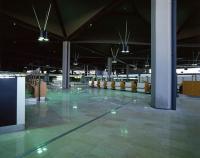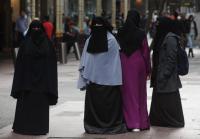-
Brazil lends $895 million to Rio de Janeiro for Olympics security
Brazil’s government has loaned 2.9 billion reais ($895 million) to the state of Rio de Janeiro to cover some of the security costs of the Olympic Games, which open on 5 August. The state of Rio de Janeiro last week declared a state of fiscal emergency. Government officials said the loan was meant to guarantee safety and security at the Olympic Games. As many as half a million foreign visitors are expected to arrive in Rio during the state’s worst financial crisis in decades.
-
-
Explaining the Istanbul bombing: Turkey’s six foreign policy sins

The terror attack at Istanbul’s Ataturk airport overshadowed two major headline events: Turkey’s bridging the rifts with Russia and normalizing relations with Israel. Both these events had to do with Turkey attempting to change course on policies that may well have opened the door to the airport bombing. Turkey’s view of the Kurds – in both Turkey and Syria – as the major threat Turkey was facing had led it toturn a blind eye to Islamic radicalism brewing in its backyard. In fact, Turkey helped ISIS by buying oil from ISIS-controlled oil fields, and allowed thousands of foreigners to go through Turkey on their way to join ISIS. Turkey hoped that ISIS would defeat the Syrian Kurds, and also take out President Assad, Turkey’s nemesis, but ISIS has failed on both fronts. Turkey has begun to distance itself from ISIS, and in response the Islamist organization has begun to launch suicide attacks against Turkish targets. Burying the hatchets with Russia and Israel might make Turkey more secure in the region, and signal to the rest of the international community that more substantive positive changes in Turkish foreign policy are yet to come. Only time will tell if they would include a more resolved Turkish response against ISIS.
-
-
Turkey identifies the three terrorists as a Russian, Uzbek, and Kyrgyz
Turkish security officials have said that the three terrorists who attacked the Istanbul airport were foreign nationals – a Russian, Uzbek, and Kyrgyz. The officials, who spoke with Western news agencies, said that investigators faced difficulties identifying the bombers from their limited remains, but a pro-government Turkish newspaper had said the Russian bomber was from Dagestan, a restless province which borders Chechnya.
-
-
U.S. airstrikes kill more than 250 ISIS militants outside Fallujah
A U.S.-led coalition airstrikes on Wednesday killed more than 250 ISIS Islamist militants as they tried to leave the Iraqi city of Fallujah in a 40-vehicle convoy. U.S. officials said that the number of casualties is likely to be higher. It was one the deadliest coalition’s strikes against ISIS.
-
-
New death threats targeted Charlie Hebdo’s editorial staff
French security services are investigating death threats made towards the satirical magazine Charlie Hebdo. Le Parisien reports that a source close to the investigation told the newspaper the first threat was posted on the magazine’s Facebook account before being removed by an unknown person.
-
-
41 killed, 239 injured in three suicide explosions at Istanbul Atatürk airport

Turkish authorities say that forty-one people have been killed and 239injured in a terrorist attack on Turkey’s largest airport, Istanbul Atatürk. The airport is Europe’s third busiest airport. The Turkish Ministry of Justice said that two terrorists blew themselves up outside the security checkpoint at the entry to the international terminal. A third terrorist blew himself up in the terminal’s parking lot. Recent months have seen an increase in terrorist attacks against Turkish civilians. These attacks have been carried out by both ISIS Islamists and PKK Kurdish separatists.
-
-
Liberals, conservatives differ in response to Osama bin Laden’s death
Conservative Americans remained unwaveringly suspicious of foreigners following Osama bin Laden’s death, while liberals dropped their guard briefly before returning to more vigilant beliefs, finds a provocative new study. The findings suggest conservatives and liberals respond differently to major events and may have implications for promoting peace and reducing conflict with people who challenge one’s core values.
-
-
Veils, headscarves may improve observers' ability to judge truthfulness

Judges in the United States, the United Kingdom, and Canada have ruled that witnesses may not wear the niqab, which covers everything but the eyes, when testifying, in part because they believe that it is necessary to see a person’s face to detect deception. Contrary to the opinions of these courts, it is easier to determine the truthfulness of a woman wearing a headscarf or even a veil that leaves only her eyes exposed than a woman wearing no head covering at all, according to new research.
-
-
French beaches to be patrolled by armed police lifeguards
The vacation season in France is about the start, and the French authorities have decided to place armed police lifeguards – who will also wear bullet-proof vests — on the country’s busiest beaches amid fears that terrorists may target beachgoers and vacationing families. Islamist terrorists have recently attacked beach resorts in Tunisia and Ivory Coast.
-
-
Jordaniana stole CIA weapons shipped to Syrian rebels -- and sold them on the black market

Jordanian intelligence chiefs stole millions of dollars worth of weapons sent by the CIA to Jordan for Syrian rebels — and sold on the black market. Jordanian intelligence officers were able to steal the weapons because they had direct access to the cargo. These officers “regularly siphoned truckloads” of the arms, delivering only a tiny fraction of them to the moderate Syrian rebels. Experts say the stolen weapons ended up in the possession of criminal networks or ISIS sympathizers.
-
-
Iran’s use of civilian planes to arm Assad could jeopardize $25B Boeing deal
The $25 billion aircraft deal that Boeing recently struck with Iran could be jeopardized by Tehran’s continued support of Syrian dictator Bashar al-Assad. Boeing’s jets will be sold to the state-owned Iran Air, which was sanctioned by the Treasury Department in 2011 partially due to its transport of “potentially dangerous Islamic Revolutionary Guard Corps (IRGC)-related cargo” and “missile or rocket components” to Syria. A Western intelligence report seen by Reuters in 2012 noted that Iran continued using civilian aircraft to transport large amounts of arms and personnel to aid Assad.
-
-
State Department holds competition for social media apps challenging terrorism
Can the obsession millennials have with smart technology be capitalized on as a weapon against terrorist propaganda? The U.S. Department of State thinks so, and has selected three teams of student finalists — chosen from fifty-six universities around the world — to its headquarters in Washington, D.C., next week for the “Peer-to-Peer: Challenging Extremism challenge.”
-
-
Bin Laden’s bodyguard released from Guantanamo after 14 years in custody
Abdel Malik Abdel Wahab al-Rahabi, a Yemenite who was one of Osama bin Laden’s bodyguards, has been released from Guantanamo after being held for fourteen years in custody without charges filed against him. The Department of Defense cleared al-Rahabi for release in March 2014, but he release was delayed because of the war in Yemen. Instead of Yemen, al-Rahabi has been sent to Montenegro to be resettled there. Al-Rahabi is the second former Gitmo inmate to be resettled in Montenegro.
-
-
Colombian government, FARC announce end to Latin America’s longest war

In a historic move, the Colombian government and Marxist FARC guerrilla movement have announced that they have reached a deal on a bilateral ceasefire — the last major step toward ending one of the world’s longest wars. The cease fire agreement will be signed on Thursday in Havana by President Juan Manuel Santos and FARC rebel leader Rodrigo Londono, better known by his nom de guerre Timochenko. The war between the Marxist FARC and successive Colombian governments began in 1964. It has claimed 220,000 lives and forced 6.6 million out of their homes. ”Un sueño que comienza a ser realidad,” tweeted Juan Manuel Santos, Colombia’s president.
-
-
Community policing practices to prevent violent extremism
A new manual designed for police departments identifies a set of promising practices for using community policing to prevent violent extremism. “Creating a comprehensive community outreach program can build the kind of trust necessary to combat violent extremism,” said the manual’s lead author.
-
More headlines
The long view
How Male Grievance Fuels Radicalization and Extremist Violence
Social extremism is evolving in reach and form. While traditional racial supremacy ideologies remain, contemporary movements are now often fueled by something more personal and emotionally resonant: male grievance.
